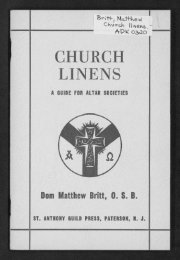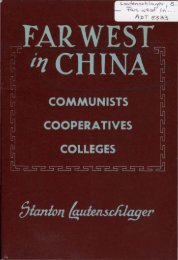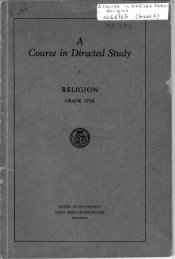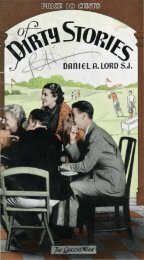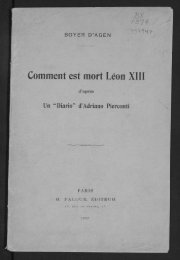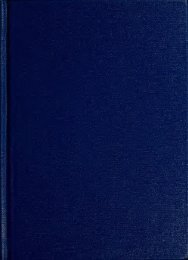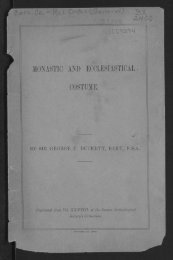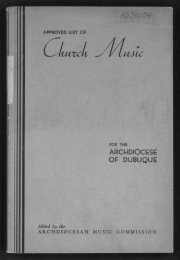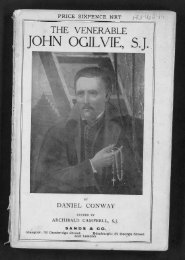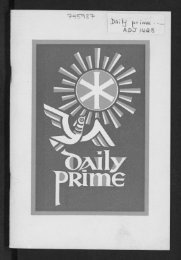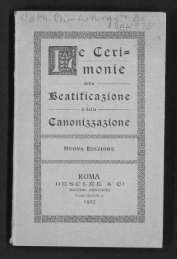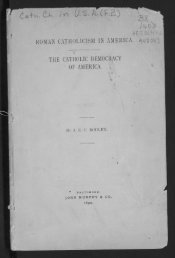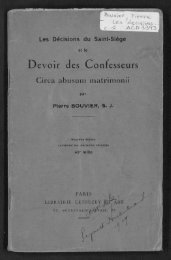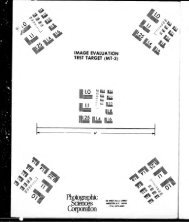Fabiola : or, The church of the catacombs - Digital Repository Services
Fabiola : or, The church of the catacombs - Digital Repository Services
Fabiola : or, The church of the catacombs - Digital Repository Services
Create successful ePaper yourself
Turn your PDF publications into a flip-book with our unique Google optimized e-Paper software.
aspirings <strong>of</strong> <strong>the</strong> 1<br />
l<strong>of</strong>ty mind to something higher find m<strong>or</strong>e noble<br />
; ami, with a kind <strong>of</strong> jealoi<br />
ked tin' longings<br />
<strong>of</strong> <strong>the</strong> youthful heart to ! m<strong>or</strong>e intimately united with its<br />
Ami he, po<strong>or</strong> child, grew up from childhood to boyhood,<br />
from boyhood to early manhood, with no one to teach him what<br />
hu craved to know, with <strong>the</strong> noble instincts <strong>of</strong> his fresh young<br />
stretching <strong>the</strong>mselves out to something to which lie 1 could<br />
not give a name, and no ono to tell him what that something<br />
was, with no one to tell him that <strong>the</strong> aspirings <strong>of</strong> liin heart<br />
were after its God, with no one to teach him that <strong>the</strong> proud<br />
passions Unit w. iv in his nature were to be rendered subservient<br />
to those higher aspirations, with no one to teach him<br />
how to be, good. But let him take courage. <strong>The</strong> good Jesus<br />
is already seeking him to take him upon His shoulders, and<br />
carry him home to Himself.<br />
CHAPTEE V.<br />
TUB FIEST DOUBT.<br />
WHEN Edwin was about fifteen years <strong>of</strong> age, it was announced<br />
one Sunday that in a few weeks <strong>the</strong> bishop <strong>of</strong> <strong>the</strong> dioer.se<br />
would visit <strong>the</strong> parish in <strong>or</strong>der to administer confirmation to<br />
<strong>the</strong> younger members <strong>of</strong> <strong>the</strong> congregation, and <strong>the</strong>y were told<br />
to prepare <strong>the</strong>mselves to receive it. Edwin tried hard to<br />
understand what confirmation was, but he could not succeed.<br />
He felt that it would be useless to question his fa<strong>the</strong>r on <strong>the</strong><br />
point, and confidence between himself and Mr. Grant, <strong>the</strong> rect<strong>or</strong><br />
<strong>of</strong> <strong>the</strong> parish, had been so effectually crushed in his childhood<br />
by <strong>the</strong> incident mentioned in <strong>the</strong> last chapter, that he<br />
could not make up his mind to speak to him. He listened<br />
eagerly every Sunday, homing to hear from <strong>the</strong> pulpit some<br />
explanation <strong>of</strong> <strong>the</strong> rite, <strong>or</strong> whatever it might be ; but no explanation<br />
came until <strong>the</strong> Sunday preceding <strong>the</strong> day on which<br />
<strong>the</strong> bishop was to administer it. <strong>The</strong>n, indeed, Mr. Grant<br />
spoke about it ; but Edwin could make nothing oiit <strong>of</strong> it. Mr.<br />
Grant was very "low <strong>church</strong>," and, consequently, looked upon<br />
confirmation as a mere rite, without sacramental character <strong>or</strong><br />
efficacy attached to it, and in explaining his views he succeeded<br />
so perfectly in lowering that which he undertook to explain,<br />
that very few, indeed, <strong>of</strong> his hearers could have been much im-<br />
pressed with a feeling <strong>of</strong> awe <strong>or</strong> respect f<strong>or</strong> that which <strong>the</strong>y<br />
were to receive, <strong>or</strong> have felt much obligation <strong>of</strong> preparing<br />
<strong>the</strong>mselves very exactly <strong>or</strong> carefully f<strong>or</strong> its reception.<br />
Edwin felt that <strong>the</strong>re was something wrong in all this. He<br />
endeav<strong>or</strong>ed to make himself believe that confirmation was<br />
something m<strong>or</strong>e holy and <strong>of</strong> higher character that Mr. Grant's<br />
teaching seemed to suppose. Young as he was, and with <strong>the</strong><br />
i s<br />
1>; ions <strong>of</strong> his strong nature so little disciplined and brought<br />
under, he felt that he was unw<strong>or</strong>thy to receive <strong>the</strong> sacred rite,<br />
f<strong>or</strong> such he thought it. His active mind began to w<strong>or</strong>k, and<br />
he used to wonder whe<strong>the</strong>r confirmation had been always<br />
looked upon in <strong>the</strong> same light in which Mr. Grant seemed to<br />
regard it, and whe<strong>the</strong>r our f<strong>or</strong>efa<strong>the</strong>rs had always had such a<br />
mean opinion <strong>of</strong> it, and if so, how it was that <strong>the</strong>y had ever begun<br />
to practise it. <strong>The</strong>se ideas, without taking any very definite<br />
shape, were continually flitting through his brain, filling<br />
him with uneasiness and doubt, and his conviction <strong>of</strong> <strong>the</strong> hollowness<br />
<strong>of</strong> <strong>the</strong> whole proceeding was rendered complete, when<br />
Mr. Grant called.one day, and after asking him a single question<br />
in <strong>the</strong> Catechism, gave him a certificate to be given to <strong>the</strong><br />
bishop, <strong>or</strong> his attendant, certifying that he was duly prepared<br />
and fit to receive confirmation.<br />
Edwin felt that he was not fit to receive it, and, m<strong>or</strong>eover,<br />
that no one had taken pains to teach him how to prepare him-<br />
self. How, <strong>the</strong>n, could Mr. Grant certify that he was w<strong>or</strong>thy<br />
to receive <strong>the</strong> sacred rite ? Or, if he were w<strong>or</strong>thy, what could<br />
be <strong>the</strong> dignity <strong>of</strong> that which he was to receive, if his preparation<br />
sufficed to receive it w<strong>or</strong>thily ? and, as his ncute intellect<br />
\ er all this, <strong>the</strong> first doubt which prepared <strong>the</strong> way<br />
f<strong>or</strong> all thai followed \va.-i implanted in his youthful mind.<br />
Ou <strong>the</strong> appointed day, however, Edwin knelt bef<strong>or</strong>e <strong>the</strong><br />
TWO r/ryo/.'//:,s'.<br />
>,<br />
and had <strong>the</strong> tips <strong>of</strong> <strong>the</strong> fingers <strong>of</strong> that reverend p<br />
i'<strong>or</strong> a moment mi his head. In tl<br />
i<br />
(Inint. and a large number <strong>of</strong> his friends dined witJi<br />
hon<strong>or</strong> <strong>of</strong> <strong>the</strong> event. <strong>The</strong>y were all lavish with<br />
congratulations to Edwin, and he was quit-- <strong>the</strong> hero <strong>of</strong> <strong>the</strong><br />
day ; but he was very s<strong>or</strong>rowful. His heart felt quite empty,<br />
and he would <strong>of</strong>ten, during <strong>the</strong> evening, have wished to jvtir<br />
to his own little room to relieve himself by tears. Why did<br />
<strong>the</strong>y congratulate him ? What had he done w<strong>or</strong>thy <strong>of</strong> congratulation<br />
? And finding no answer to <strong>the</strong>se questions which<br />
continually presented <strong>the</strong>mselves to him, he felt himself m<strong>or</strong>e<br />
lonely than ever, m<strong>or</strong>e dissatisfied with himself and all around<br />
him, and <strong>the</strong> old feeling <strong>of</strong> his early childhood came buck with<br />
renewed intensity, and he longed and. wished and prayed f<strong>or</strong><br />
some one to teach him how to be good f<strong>or</strong> <strong>the</strong> good Jesus to<br />
take him on His shoulders to carry him home, f<strong>or</strong> he felt as if<br />
this latest act <strong>of</strong> his religious life, so to call it, had but ten<br />
to render <strong>the</strong> gulf between himself and God wider and m<strong>or</strong>e<br />
apparent than ever ; and, young as he was, natural as he was,<br />
unenlightened as he was, he knew that it ought not to be so.<br />
On <strong>the</strong> Sunday preceding <strong>the</strong> confirmation, Mr. Grant announced<br />
that it was his wish that all <strong>the</strong> recipients should, on<br />
<strong>the</strong> Sunday following, approach <strong>the</strong> communion table. If<br />
po<strong>or</strong> Edwin had been perplexed about confirmation, his perplexities<br />
and troubles were now increased a thousand-fold.<br />
Mr. Stanhope " received" three <strong>or</strong> four times a year, because<br />
most respectable people did <strong>the</strong> same ; but he had no fixed<br />
and clear notion <strong>of</strong> <strong>the</strong> nature and character <strong>of</strong> <strong>the</strong> action he<br />
perf<strong>or</strong>med; and Mr. Grant's views were <strong>of</strong> <strong>the</strong> very lowest kind.<br />
Edwin had frequently heard him declaim with violence against<br />
what he called <strong>the</strong> idolatrous and blasphemous doctrine <strong>of</strong> <strong>the</strong><br />
" real presence" <strong>of</strong> our L<strong>or</strong>d in <strong>the</strong> sacrament. He had i<br />
Mr. Grant frequently declare that <strong>the</strong>re was nothing but <strong>the</strong><br />
mere bread and wine present, and that it was impious and<br />
wicked to believe anything else, and consequently, he was inclined<br />
to believe it must be so ; but ever and anon <strong>the</strong> solemn<br />
w<strong>or</strong>d came flitting through his mind: "This is My Body,"<br />
(St. Mat<strong>the</strong>w, xxvi. 26) ; and also, " This is My Blood <strong>of</strong> <strong>the</strong><br />
New Testament, which shall be shed f<strong>or</strong> many unto remission<br />
<strong>of</strong> sins," (ver. 28), and he could not see how to reconcile <strong>the</strong>m<br />
with <strong>the</strong> teachings <strong>of</strong> Mr. Grant. Not that he thought Mr.<br />
Grant could be wrong, <strong>or</strong> be teaching what was false, Edwin<br />
kuew nothing <strong>of</strong> religion but what he had learnt from his<br />
fa<strong>the</strong>r and Mr. Grant, aud he thought it certain that <strong>the</strong>y were<br />
right ; but, never<strong>the</strong>less, <strong>the</strong>re was something<br />
in <strong>the</strong>ir teach-<br />
ing and especially on this point with which his intellect refused<br />
to be satisfied. M<strong>or</strong>eover, as <strong>the</strong> day drew near when he<br />
was to approach <strong>the</strong> L<strong>or</strong>d's table f<strong>or</strong> <strong>the</strong> first time, he sat f<strong>or</strong><br />
hours with his Bible bef<strong>or</strong>e him, pondering over <strong>the</strong> passages<br />
relating to <strong>the</strong> Eucharist, and becoming m<strong>or</strong>e and m<strong>or</strong>e perplexed,<br />
and m<strong>or</strong>e and m<strong>or</strong>e uneasy. With an ardent desire to<br />
do what was right, he meditated on <strong>the</strong> w<strong>or</strong>ds <strong>of</strong> St. Paul :<br />
"<br />
<strong>The</strong>ref<strong>or</strong>e, whoever shall eat this bread <strong>or</strong> drink <strong>the</strong> chalice<br />
<strong>of</strong> <strong>the</strong> L<strong>or</strong>d unw<strong>or</strong>thily, shall be guilty <strong>of</strong> <strong>the</strong> body and blood<br />
himself : and so let him<br />
<strong>of</strong> <strong>the</strong> L<strong>or</strong>d. But, let a man prove<br />
eat <strong>of</strong> that bread and drink <strong>of</strong> that chalice. F<strong>or</strong>, he that eat-<br />
eth and drinketh unw<strong>or</strong>tfiily, eateth and drinketh<br />
judgment to himself, not discerning <strong>the</strong> body <strong>of</strong> <strong>the</strong><br />
L<strong>or</strong>d" (1 C<strong>or</strong>. xi. 27, 28, 29); but <strong>the</strong> m<strong>or</strong>e he<br />
thought <strong>the</strong> m<strong>or</strong>e bewildered he became ; and he asked himself<br />
how he could be guilty <strong>of</strong> <strong>the</strong> body and blood <strong>of</strong> <strong>the</strong> L<strong>or</strong>d,<br />
if that body and blood were not present in <strong>the</strong> Sacrament ? <strong>or</strong><br />
how he could eat and drink judgment to himself f<strong>or</strong> not dis-<br />
<strong>of</strong> <strong>the</strong> L<strong>or</strong>d were<br />
cerning <strong>the</strong> body <strong>of</strong> <strong>the</strong> L<strong>or</strong>d, if <strong>the</strong> body<br />
not present? <strong>The</strong>n, at times, he would seem convinced that<br />
Mr. Grant was right, aud that <strong>the</strong>re was nothing present but<br />
bread and wine ; but <strong>the</strong> awful denunciation <strong>of</strong> <strong>the</strong> apostle<br />
would present itself in all its dreadful clearness to him,<br />
his cheek would blanch, aud he would tremble with fear<br />
and<br />
and<br />
excitement as he murmured <strong>the</strong> solemn w<strong>or</strong>ds "<br />
: <strong>The</strong>ref<strong>or</strong>e,<br />
let a man prove himself F<strong>or</strong>, he that eateth and<br />
drinketh unw<strong>or</strong>thily, etiteth and drinketh judgment to himself,<br />
nut discerning <strong>the</strong> body <strong>of</strong> <strong>the</strong> L<strong>or</strong>d."



